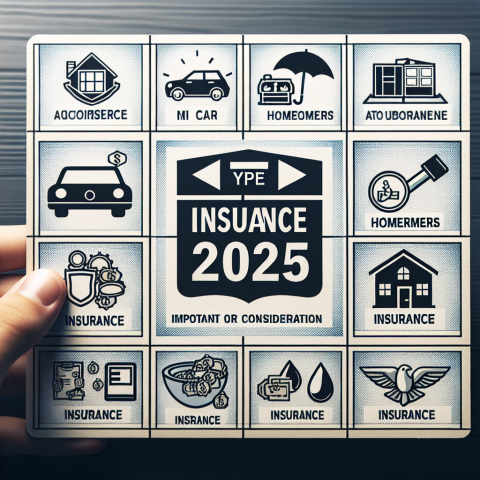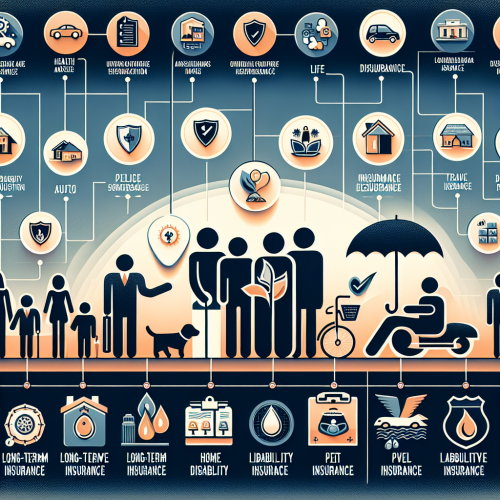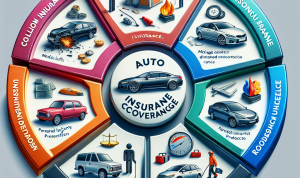Types of Insurance – Let’s face it—no one really wants to think about insurance. It’s one of those things that we all know we need but put off dealing with until it’s absolutely necessary. Trust me, I’ve been there. The thing is, insurance is a vital part of adulting and financial planning. It’s like that safety net you hope you never need but are really thankful for if life throws a curveball your way.
Over the years, I’ve learned the hard way (and sometimes the easy way) that insurance isn’t just about checking boxes. It’s about protecting yourself, your loved ones, and your future. In 2025, with everything going digital and life feeling more uncertain than ever, making sure you’re properly insured is more important than ever. So, here are six types of insurance every individual should consider.

6 Types of Insurance Every Individual Should Consider in 2025
1. Health Insurance: Your Lifeline When Things Go South
When I first started working and had the option of health insurance through my job, I was skeptical. I didn’t think I’d need it. After all, I was young, healthy, and invincible, right? Well, I quickly learned that health problems don’t always give you a heads-up.
One time, I twisted my ankle while hiking. It seemed like nothing, but it ended up being a bigger deal than I thought, and I had to go to urgent care. That little trip cost me hundreds of dollars—and that’s when I realized the importance of having health insurance.
In 2025, healthcare costs continue to rise, and even a basic medical issue can set you back financially. Whether it’s routine checkups, unexpected accidents, or surgeries, health insurance helps cover those costs. If you don’t have employer-sponsored health insurance, consider looking into marketplace plans or even short-term health insurance plans that can cover basic needs. I always recommend comparing plans to make sure you get the right coverage for your needs.
Pro tip: Health insurance isn’t just about big hospital bills. It covers preventive care, too, which can save you money in the long run.
2. Auto Insurance: Protect Yourself and Your Ride
I’ve had my share of car accidents (none too serious, thankfully), but every single one reminded me why auto insurance is a must. From fender benders to bad weather, accidents happen when you least expect them.
In 2025, auto insurance is still a legal requirement in most places, but it’s also one of the most important financial protections you can have. It covers everything from damage to your car and medical bills to liability for accidents you cause. While the laws might only require basic coverage, I learned that the more comprehensive your plan, the better.
When I upgraded to a full coverage policy, it felt like a bit of an expense at first, but then I was in a minor accident that would’ve cost me thousands if I didn’t have it.
Pro tip: If you have an older car, you might not need full coverage. Just make sure you’re covered for liability, at the very least.
3. Life Insurance: For the People Who Matter Most
Okay, I’ll be honest here—life insurance can feel like a depressing topic. But once I started thinking about the people I care about, it clicked. Life insurance is designed to protect your loved ones financially if something were to happen to you. It’s about making sure they can still live comfortably and cover expenses like the mortgage, bills, or even funeral costs.
I bought a life insurance policy when I realized how much I relied on my paycheck. If something happened to me, I didn’t want my family to worry about money. There are different types of life insurance, but term life insurance (which is cheaper) is perfect if you’re just starting out and need coverage for a certain period (like until the kids are grown or your mortgage is paid off).
Pro tip: Shop around for life insurance. You can usually get a policy for much less than you think, and some policies are easier to manage than others.
4. Disability Insurance: What Happens if You Can’t Work?
I used to think that disability insurance was just for people with dangerous jobs. But then I realized that anyone can get sick or injured and end up unable to work for a while.
Let’s be real: most of us rely on our paycheck to pay the bills. I made the mistake of assuming I’d never need disability insurance—until I sprained my wrist during a workout and couldn’t type for a week. That week without income was tough, but if I had disability insurance, it would’ve covered a portion of my lost income.
Disability insurance replaces a portion of your income if you’re unable to work due to illness or injury. In 2025, more companies are offering short-term and long-term disability plans, so it’s worth looking into if your employer doesn’t provide it.
Pro tip: Don’t wait for an accident to happen. It’s cheaper and easier to get disability insurance when you’re younger and healthier.
5. Homeowners or Renters Insurance: Protect Your Home and Belongings
Whether you own or rent, protecting your home (and the stuff inside it) is essential. I can’t tell you how many times I’ve heard horror stories about people losing everything in a fire or a flood, only to realize they didn’t have the proper coverage.
Homeowners insurance covers things like fire, theft, and natural disasters, while renters insurance protects your belongings if you’re renting a place. It’s an easy way to protect yourself from unexpected financial hardship. In fact, when I moved into my first apartment, renters insurance was so affordable that I couldn’t justify not getting it.
The bonus with renters insurance is that it’s not just about your belongings—it can also cover liability. So if someone gets injured while visiting your apartment, you’re protected.
Pro tip: Shop around for both renters and homeowners insurance. You can often bundle these with auto insurance for a discount.
6. Umbrella Insurance: Extra Protection for Everything Else
Umbrella insurance is like the backup plan to your backup plan. It offers extra liability protection beyond what your regular insurance policies cover. I’ll admit, I didn’t think about getting umbrella insurance until I realized how quickly a lawsuit or a big accident could wipe out everything I’ve worked for.
Let’s say you’re in a car accident, and the medical bills are way higher than your auto insurance covers. Or, someone sues you for something unrelated to your car or home. That’s where umbrella insurance comes in—it helps cover those unexpected situations.
Pro tip: You can usually get umbrella insurance for a surprisingly low cost. If you have assets to protect, it’s definitely worth considering.
Final Thoughts
Insurance can feel overwhelming, but when you break it down, it’s just a series of safety nets that protect you, your family, and your finances. By getting the right coverage in 2025, you’re making sure that you can navigate life’s curveballs with confidence. It’s one of those things you don’t realize how much you need until you actually do need it. So, take a little time, figure out what’s best for you, and get the peace of mind that comes with knowing you’re covered.



